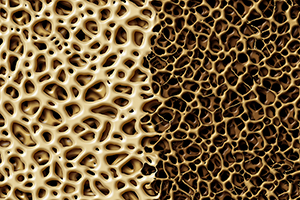



| By Dr. Ronald Hoffman
Most patients with typical male or female pattern baldness are screened for underlying diagnoses that can cause hair loss. These typically include thyroid disease, iron deficiency anemia and perimenopause. When such underlying disorders are ruled out, however, patients often are left in the frustrating position of being offered less than optimal treatments for hormonally mediated hair loss.
Treatments can be broken down into topical and oral medications and supplements. Well-researched topical treatments include minoxidil, retinoic acid, nettles and pygeum. Research into topical copper peptides also looks promising.
The main mechanism of hormonally mediated hair loss involves the hormone testosterone and its metabolism. Testosterone is converted into an enzyme called 5-alpha-reductase, which then converts the testosterone into dihydrotestosterone (DHT). However, there are 2 types of DHT: DHT 1 receptors are located in the skin, and DHT 2 receptors are primarily located in the prostate. The limited efficacy of Propecia may be due to the fact that it blocks only the DHT 2 receptors. Side effects can include decreased libido and erectile dysfunction. These effects often can be alleviated with the addition of the amino acid, arginine, a potent vasodilator. Propecia also can cause a birth defect known as hypospadias in male fetuses if used by pregnant women.
Recent studies indicate that copper ion may be effective in inhibiting DHT 1 as well as DHT 2 when administered topically.
Saw palmetto (Serenoa repens) is a well-known treatment that works by blocking both 5-alpha-reductase and inhibiting the uptake of DHT at target tissue receptor sites. We tend to limit its use to the treatment of prostate symptomatology.
Pygeum, or pine bark extract, is a potent antioxidant often added to saw palmetto for the treatment of prostatic hyperplasia. Likewise, nettles, a root commonly used both with saw palmetto and also separately as a natural antihistamine, blocks both DHT and estrogen. These are both safe for oral and topical administration with appropriate patient screening.
The topical preparation minoxidil increases blood flow to the scalp. This is one proposed mechanism of action. Studies are limited to the extra-strength 5 percent solution. The addition of retinoic acid to minoxidil both augments the DHT inhibition and increases the absorption of the minoxidil.
Dutasteride is both a DHT 1 and DHT 2 blocker that has just been approved for the treatment of benign prostatic hyperplasia. It will most likely be available to be prescribed by March 2002 for this indication. Phase 3 trials are currently ongoing for the treatment of male pattern baldness with dutasteride.
On a more holistic note, it’s important to address proper nutritional support for optimal treatment of hormonally mediated baldness. In a study on insulin resistance in non-obese patients with polycystic ovarian syndrome, it was found that the increased testosterone levels found in these patients correlated inversely with insulin resistance. A study in The Lancet in Sept. 30, 2000; 356: 1165-1166 suggested that insulin resistance could provide a causative mechanism whereby early androgenic hair loss could result. Male pattern baldness may actually be mediated by insulin resistance, not simply exacerbated by it.
Researchers looked at several factors associated with insulin resistance.
– elevated lipids
– elevated fasting glucose
– high body-mass index
– elevated systolic blood pressure
They found that the group with significant hair loss had:
– hyperinsulinemia risk that was increased nearly twofold
– moderate obesity that was increased nearly twofold
– severe obesity that was increased 150 percent
– use of cholesterol-lowering medication was increased more than fourfold
– use of blood pressure medication was more than double
The article actually suggests that men with early onset male pattern baldness should be screened for insulin resistance and other cardiovascular risk factors. So, in addition to being cardio-protective, it seems that a low-carbohydrate diet may actually help prevent hair loss.
Though we think of declining estrogen as the hallmark of menopause, it's actually common for…

Up to 12 percent of Americans have ulcers at some point in life. Peptic ulcers…
Gallbladder disease is a modern illness. An estimated 20 million Americans have gallbladder disease. The…

Lately, I’ve been sharing with Intelligent Medicine listeners that I’ve been augmenting my diet with…

Q: I am a 77-year-old woman. On recent bone density test, lumbar spine results range…

The 1973 sci-fi movie Soylent Green depicts a dystopian future in which over-population and environmental…

A New Era in Wellness: Non-CBD Innovations with Lex Pelger, Part 1

Our virtual voicemail is open 24/7, so there's no need to wait to submit your questions for Dr. Hoffman. Leave a message, and you may hear your question featured on the Intelligent Medicine radio program!